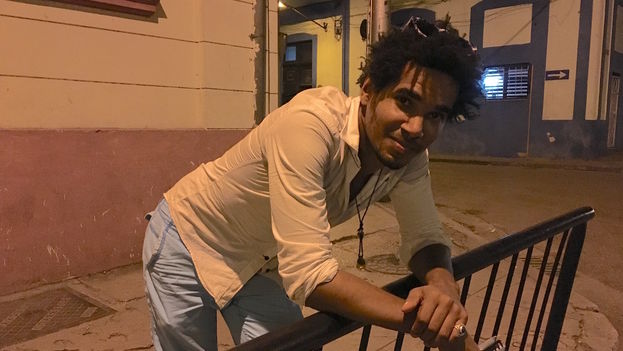
![]() 14ymedio, Havana, 27 February 2018 — The organizers of the Havana #00 Biennial, an independent event whose celebration is scheduled from May 5-15, have won the support of several artists and independent spaces on the island, according to Luis Manuel Otero Alcántara, one of the promoters of the initiative, speaking to 14ymedio.
14ymedio, Havana, 27 February 2018 — The organizers of the Havana #00 Biennial, an independent event whose celebration is scheduled from May 5-15, have won the support of several artists and independent spaces on the island, according to Luis Manuel Otero Alcántara, one of the promoters of the initiative, speaking to 14ymedio.
Among the artists who have confirmed their participation in the event are Lázaro Saavedra, winner of the 2014 National Plastic Arts Prize, and the well-known Tania Bruguera, founder of the Hannah Arendt International Institute of Artivism Hanna Arendt (INSTAR).
Also planning to participate are independent exhibition spaces and artistic projects such as Aglutinador, managed by Sandra Ceballos, and the Riera Studio of Samuel Riera. The list is completed by the independent gallery El Oficio, together with the studios Yo Soy El Que Soy and Coco Solo Social Club.
The #00 Biennal is being convened by the Museum of Politically Uncomfortable Art (MAPI), a section of the Dissidents Museum located in Old Havana.
Otero Alcántara explains that within the 10-day program they plan to stage activities in different areas of the city. In each space they plan to fuse the visual arts with other cultural manifestations.
“One day is dedicated to Alamar with the Omni-Zona-Franca project and in the municipality of Habana del Este we are going to call a festival of sand sculptures, there will be performances, graffiti and concerts at night,” he says.
Another day of the independent event will take place in Guanabacoa, around in the studio of David de Omni, an experimental musician who works in rap and reggae, but also poetry.
Artists from Spain, Colombia, Mexico, Brazil, the United States, Romania and several countries in the African continent have also confirmed their participation, according to Otero Alcántara, who explains that some still prefer to maintain their support anonymously to avoid reprisals from the authorities, among which would be preventing them from entering the country.
Others, such as the Mexican Yvelin Buenrostro and the Spaniards Antonio Mas and Alicia Torres, have already decided to make their presence public, including the Cubans Jose Luis Marrero, Yuri Obregon, Los Serones, Adonis Milan, Amaury Pacheco, Iris Ruiz, Yasser Castellanos, Sam 33, 2 + 2 = 5, Happy Zombie, Yoanny Aldaya, Italo Expósito and José Ernesto Alonso.
Since this alternative biennial was initially announced, organizers explained that it was conceived “before the decision of the Ministry of Culture, the National Council of Plastic Arts and the Wilfredo Lam Center to postpone the celebration of the XIII Biennial of Havana until 2019, as a consequence of the damages caused by Hurricane Irma. The official biennial was originally scheduled from October 5 to November 5, 2018.”
To finance the independent event, its developers have started a Crowdfunding campaign through which they hope to obtain the $20,000 that they have set as budget to move the project forward.
With this arts festival they seek to “support the development of Cuban culture at a time when the country is experiencing a strong crisis of faith, an increase in the banality and despair.” The managers of the initiative consider it “essential not to delay the Biennial event and to implement if with the minimum resources.”
After announcing the schedule of the event, the Association of Artists of the Union of Writers and Artists of Cuba (UNEAC) circulated an email warning that “unscrupulous people” were “trying to organize provocations” to divide the artistic guild.
The last edition of the Havana Biennial was held between May and June 2015. In its three decades of life, the artistic event has gone through different stages where creative effervescence prevailed over the harmful effects of economic crisis and censorship.
____________________________________
The 14ymedio team is committed to serious journalism that reflects the reality of deep Cuba. Thank you for joining us on this long road. We invite you to continue supporting us, but this time by becoming a member of 14ymedio. Together we can continue to transform journalism in Cuba.
